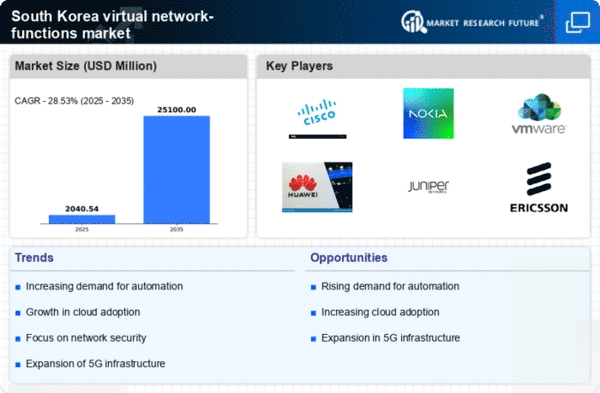Government Initiatives and Support
Government initiatives in South Korea play a crucial role in fostering the growth of the virtual network-functions market. The South Korean government has been actively promoting digital transformation across various sectors, which includes substantial investments in telecommunications infrastructure. Recent reports indicate that the government allocated approximately $1 billion to enhance network capabilities and support the adoption of advanced technologies. This financial backing is expected to stimulate innovation within the virtual network-functions market, encouraging local companies to develop and implement cutting-edge solutions. Furthermore, regulatory frameworks are being established to facilitate the deployment of virtual network functions, ensuring compliance and security. As these initiatives gain momentum, the virtual network-functions market is poised for accelerated growth, driven by both public and private sector collaboration.
Increased Focus on Cost Efficiency
Cost efficiency remains a pivotal driver in the virtual network-functions market in South Korea. Organizations are increasingly recognizing the financial benefits associated with adopting virtualized network solutions. By transitioning from traditional hardware-based systems to virtual network functions, companies can significantly reduce capital expenditures and operational costs. Recent analyses suggest that businesses can achieve cost savings of up to 30% by implementing these solutions. This financial incentive is compelling many enterprises to explore virtual network functions as a viable alternative to conventional networking methods. Additionally, the ability to optimize resource allocation and minimize downtime further enhances the appeal of virtualized solutions. As cost efficiency continues to be a priority for organizations, the virtual network-functions market is likely to expand as more companies seek to leverage these economic advantages.
Growing Importance of 5G Technology
The advent of 5G technology is transforming the telecommunications landscape in South Korea, thereby impacting the virtual network-functions market. With the rollout of 5G networks, there is an increasing demand for advanced network functionalities that can support higher data speeds and lower latency. This technological evolution necessitates the integration of virtual network functions to manage and optimize network resources effectively. Industry expert's predict that the 5G market in South Korea will reach approximately $5 billion by 2026, creating substantial opportunities for virtual network-functions providers. The ability to deliver enhanced user experiences and support a multitude of connected devices is driving the adoption of virtualized solutions. Consequently, the virtual network-functions market is expected to thrive as businesses and service providers align their strategies with the capabilities offered by 5G technology.
Emergence of Edge Computing Solutions
The rise of edge computing is significantly influencing the virtual network-functions market in South Korea. As organizations increasingly adopt edge computing to process data closer to the source, there is a growing need for virtual network functions that can efficiently manage distributed network environments. This trend is particularly relevant for industries such as manufacturing and healthcare, where real-time data processing is critical. Recent studies indicate that the edge computing market is projected to grow at a CAGR of 20% over the next few years, highlighting the potential for virtual network-functions to play a vital role in this ecosystem. By enabling seamless connectivity and reducing latency, virtual network functions are becoming essential components of edge computing strategies. As this trend continues to evolve, the virtual network-functions market is likely to expand in tandem with the increasing adoption of edge computing solutions.
Rising Demand for Network Flexibility
The virtual network-functions market in South Korea experiences a notable surge in demand for network flexibility. Organizations are increasingly seeking solutions that allow for rapid deployment and scalability of network services. This trend is driven by the need to adapt to changing business environments and customer requirements. According to recent data, the market is projected to grow at a CAGR of 15% over the next five years, indicating a robust appetite for flexible networking solutions. Companies are investing in virtual network functions to enhance their operational efficiency and reduce time-to-market for new services. This shift towards flexibility is reshaping the competitive landscape, compelling service providers to innovate and offer more agile solutions. As a result, the virtual network-functions market is likely to witness significant growth as businesses prioritize adaptability in their network strategies.
















